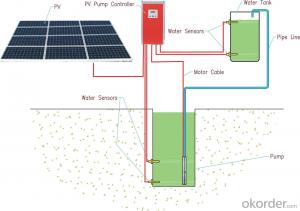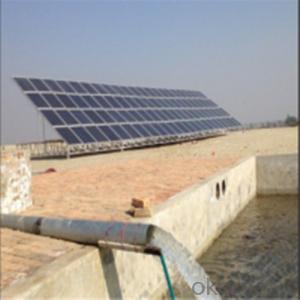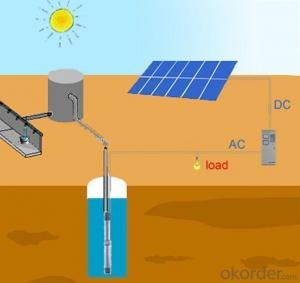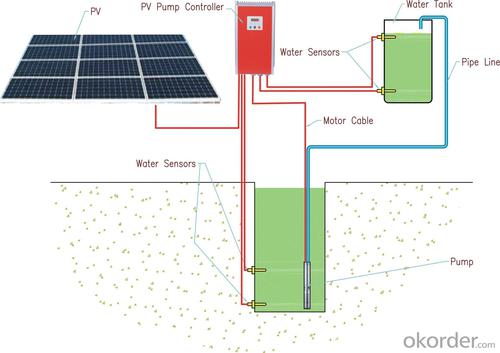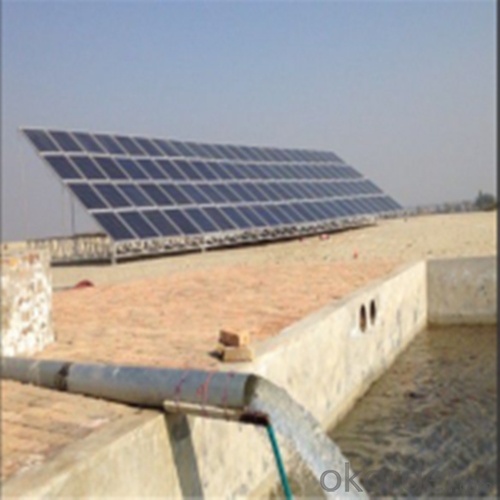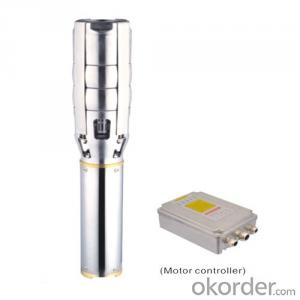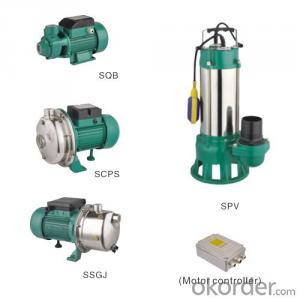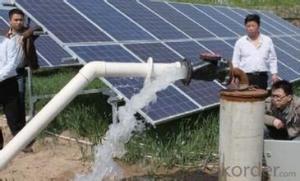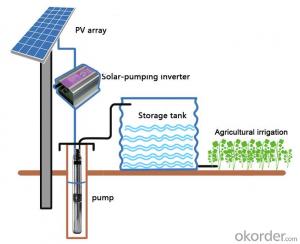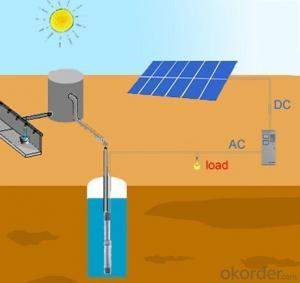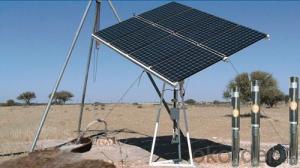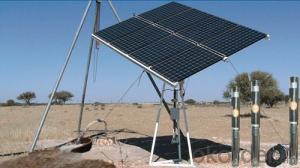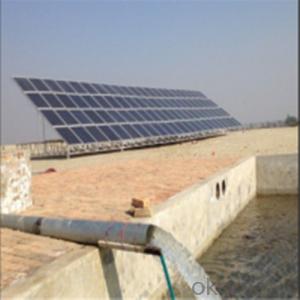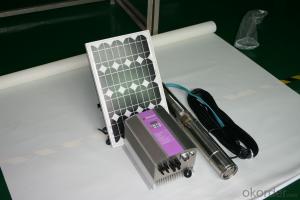Silicon Solar Pump - Battery Powered Water Pump Solar Panel Water Pumps
- Loading Port:
- Shanghai
- Payment Terms:
- TT OR LC
- Min Order Qty:
- 1 set
- Supply Capability:
- 1000 set/month
OKorder Service Pledge
OKorder Financial Service
You Might Also Like
Battery Powered Water Pump Solar Panel Water Pumps
Advanced Technology
Applications Innovation
The efficiency of DC brushless permanent magnet motor has been increased up to 25% in comparison with traditional asynchronous motor.
Technology Innovation
Stator and rotor are sealed by environment friendly casting resin.Motor insulation resistance can be hold higher than 300MΩfor more than 10 years, which consumedly increased the security and reliability of the submersible motor.
Structure Innovation
Casting resign technology processed stator and rotor as well as the water lubricated bearing make the submersible pump environment friendly.
Feature
High Efficiency & High Reliability
DC Brushless Permanent Magnet Motor
Minimum Maintenance, long Service Life
Environment Friendly Materials, Lubricated Without Oil
Automatic Control
Operate Automatically, No Need Watching
Maximum Power Point Tracking (MPPT)
Dry-run Protection
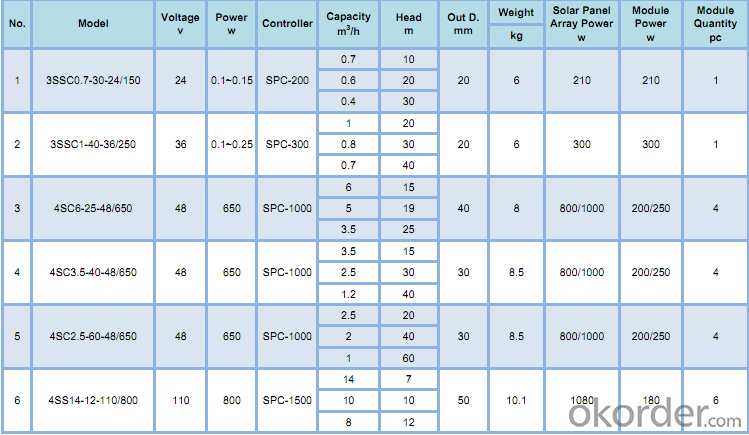
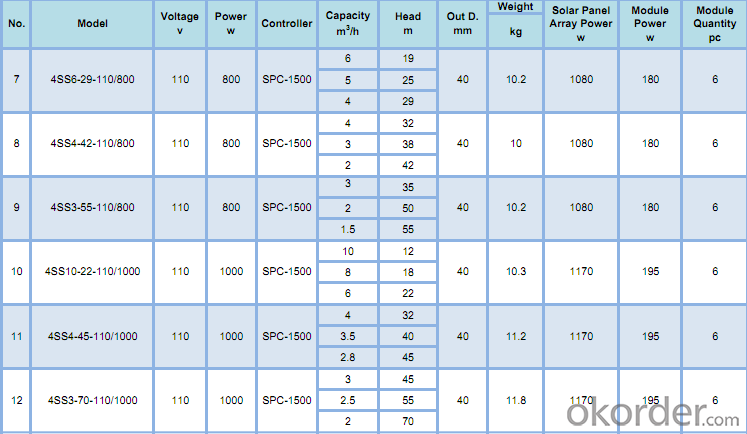
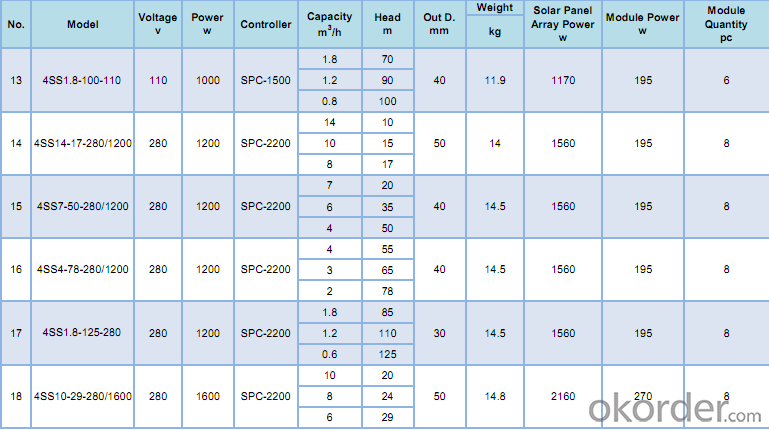
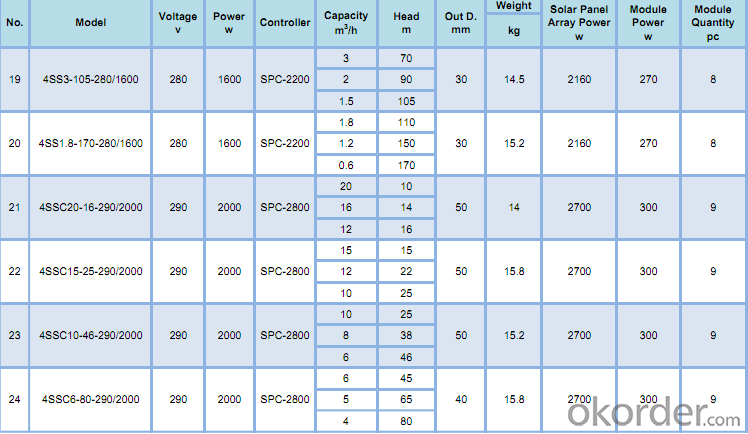
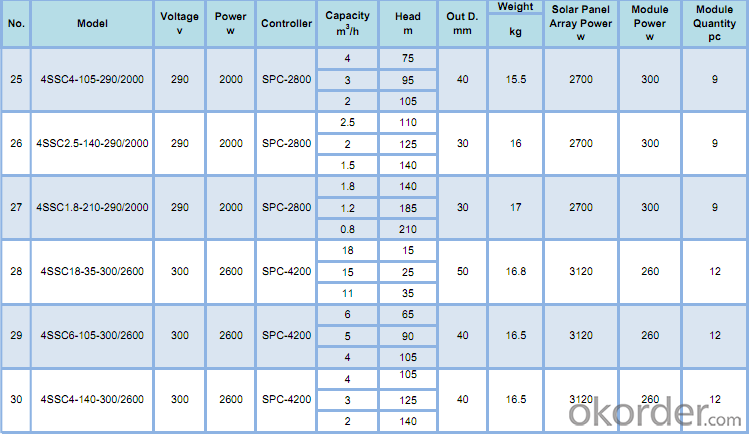
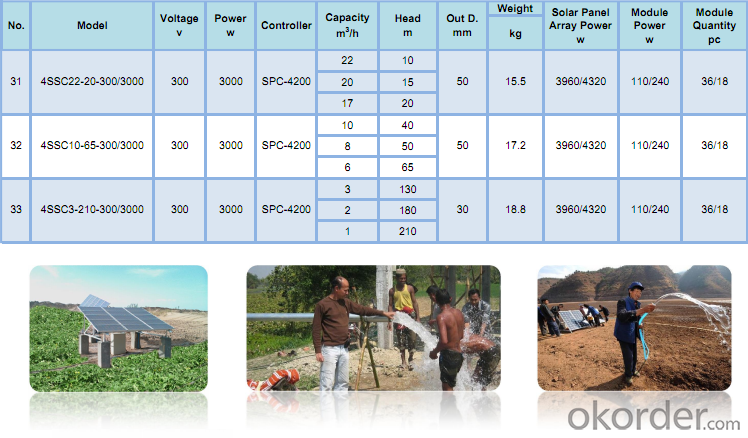
- Q: How does the voltage of the solar pump system affect its performance?
- The performance of the solar pump system greatly depends on its voltage. A higher voltage generally leads to better performance and efficiency. Increasing the voltage directly impacts the power output of the solar panels, allowing for more power generation. This, in turn, results in increased water flow and pressure from the pump, ultimately enhancing its pumping capacity and delivering water faster. Additionally, a higher voltage helps overcome any losses caused by long wire distances or resistance in the system by reducing voltage drop. However, it is important to adhere to the manufacturer's recommended voltage range to avoid damaging the pump or other components. Ultimately, the voltage directly influences the system's performance, so selecting the appropriate voltage within the manufacturer's guidelines is critical for optimal functioning.
- Q: Can a solar pump be used for emergency water supply?
- Yes, a solar pump can be used for emergency water supply. Solar pumps use solar energy to power the pumping mechanism, which means they do not rely on electricity or fuel, making them ideal for emergency situations where power may be limited or unavailable. They can be used to extract water from wells, rivers, or any other water source, providing a reliable and sustainable solution for emergency water supply needs.
- Q: Are there any limitations to the type of water a solar pump can handle?
- Yes, there are certain limitations to the type of water that a solar pump can handle. One limitation is the presence of debris or sediment in the water. Solar pumps are generally designed to handle clean water, and if the water contains a high amount of debris, it can clog the pump or damage its components. Another limitation is the level of salinity in the water. While solar pumps can handle water with some level of salinity, there is a limit beyond which the pump's efficiency may decrease or it may become damaged. The specific tolerance for salinity can vary depending on the type and model of the solar pump. Additionally, the temperature of the water can also affect the performance of a solar pump. Extreme temperatures, whether too hot or too cold, can impact the pump's efficiency and longevity. Solar pumps are typically designed to withstand a certain range of temperatures, and operating outside of this range can cause issues. Lastly, the depth of the water source can also be a limitation. Solar pumps are generally suitable for shallow water sources, such as wells or ponds. If the water source is too deep, the pump may not be able to effectively lift the water to the desired height. Overall, it is important to consider these limitations and ensure that the type of water and its conditions align with the specifications of the solar pump being used. Consulting the manufacturer's guidelines and recommendations can provide more specific information on the limitations of a particular solar pump model.
- Q: What is the maximum depth a solar pump can lift water from?
- The maximum depth a solar pump can lift water from depends on various factors such as the power of the solar panels, the efficiency of the pump, the size of the pump, and the quality of the solar pump system. In general, a solar pump can typically lift water from depths ranging from 100 to 500 feet (30 to 150 meters). However, it is important to note that as the depth increases, the efficiency and flow rate of the pump may decrease. Therefore, it is advisable to consult the manufacturer's specifications or seek professional advice to determine the maximum depth a specific solar pump can effectively lift water from.
- Q: Can a solar pump be used in areas with limited access for maintenance?
- Yes, a solar pump can be used in areas with limited access for maintenance. Solar pumps are designed to be highly reliable and require minimal maintenance compared to conventional pumps. They have fewer moving parts, reducing the chances of breakdowns, and can operate for extended periods without the need for servicing. Additionally, solar pumps are typically self-contained systems, meaning they do not rely on external power sources or complex infrastructure, making them ideal for remote areas with limited access to maintenance services.
- Q: How do you choose the right size of solar pump for your needs?
- To choose the right size of a solar pump for your needs, you should consider factors such as the water demand, the total dynamic head (TDH) or vertical lift required, and the solar panel capacity. Assess your water requirements and the distance the water needs to be pumped, as this will determine the TDH. Then, select a solar pump that can meet this TDH while also considering its flow rate capacity. Additionally, ensure that the solar panels you have or plan to install can generate enough power to operate the pump efficiently. Consulting with a solar pump expert or conducting thorough research can help you make an informed decision.
- Q: What are the benefits of using a solar pump?
- There are several benefits of using a solar pump. Firstly, it is a cost-effective and environmentally friendly alternative to traditional pumps that run on fossil fuels. Solar pumps utilize renewable energy from the sun, resulting in reduced electricity bills and lower carbon emissions. Additionally, solar pumps are typically low-maintenance and have a longer lifespan compared to conventional pumps. They are also highly versatile and can be used for various applications such as irrigation, water supply, and livestock management, especially in remote or off-grid areas where access to electricity is limited.
- Q: How do I choose the right solar pump for my needs?
- To choose the right solar pump for your needs, you should consider factors such as the water flow rate required, the total dynamic head (TDH) or vertical distance the pump needs to lift the water, the availability of sunlight in your location, the size of your water source or well, and your budget. Determine your specific water pumping requirements and then compare different models based on their specifications, efficiency, and reliability. Additionally, consult with a solar pump expert or supplier who can provide guidance and help you select the most suitable option for your needs.
- Q: Can a solar pump be used for water supply in remote agricultural farms?
- Yes, a solar pump can be used for water supply in remote agricultural farms. Solar pumps are an efficient and cost-effective solution for providing water to remote areas where access to electricity may be limited. They utilize solar energy to power the pump, reducing the dependence on traditional fuel sources and providing a sustainable water supply solution for agricultural activities in remote locations.
- Q: Are there any limitations to the flow rate of water a solar pump can handle?
- Yes, there are limitations to the flow rate of water that a solar pump can handle. The flow rate is dependent on factors such as the size and capacity of the pump, the power output of the solar panels, and the available sunlight. If the solar pump is not appropriately sized or powered, it may struggle to handle higher flow rates. Additionally, factors like the distance the water needs to be pumped and the elevation can also impact the flow rate capabilities of a solar pump.
Send your message to us
Silicon Solar Pump - Battery Powered Water Pump Solar Panel Water Pumps
- Loading Port:
- Shanghai
- Payment Terms:
- TT OR LC
- Min Order Qty:
- 1 set
- Supply Capability:
- 1000 set/month
OKorder Service Pledge
OKorder Financial Service
Similar products
Hot products
Hot Searches
Related keywords
